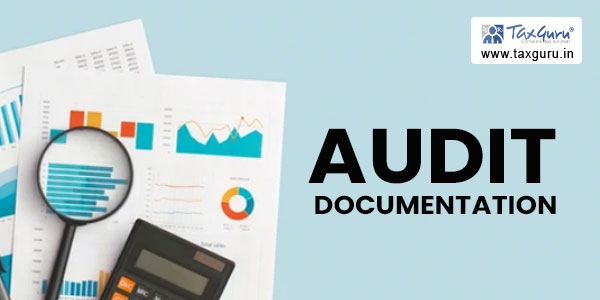Audit Documentation and its Importance
Standard on Auditing (SA) 230, ‘Audit Documentation’ prescribes the basic principles of audit documentation. Reporting requirements of Companies Act, 2013 is very much necessary as per the auditing standards. To update the knowledge of professionals, in 2013, ICAI had brought out the publication, “Implementation Guide to SA 230, Audit Documentation”. The Guide was last revised in 2018 and now in 2022 revised version is available for the professionals.
“Audit Documentation” is defined as:
“The record of audit procedures performed, relevant audit evidence obtained, and conclusions the auditor reached (terms such as “working papers” or “work papers” are also sometimes used”.
Hence, “document”, in the context of audit refers more to that which is required to be maintained by an auditor to record his findings during the course of the audit.
The audit documentation may be recorded in paper or electronic form. Examples of documents include work papers, copy or abstract of signed agreements, videos, pictures, spreadsheets, transcripts, correspondences, data in electronic form containing the records in systematic manner etc.
Why Documentation is Important?
Documentation is considered the backbone of an audit. The work that the auditor performs, the explanations given to the auditor, the conclusions arrived at, all are evidenced by documentation. Inadequate or improper documentation may be considered as deficiency in performing an audit. The auditor may have executed appropriate audit procedures, however, if there is no documentation to prove, it may put question on the work done, in case any material misstatement is reported. Improper and incomplete documentation may put the auditor in difficult situations, such as actions from various regulators.
Documentation is essential because:
- It supports the auditor’s basis for a conclusion about achieving the auditor’s objectives.
- Provides evidence that audit was planned and performed.
- It assists supervision and review.
- It results in better conceptual clarity, clarity of thought and expression.
- It facilitates better understanding and helps avoid misconception.
- It supports and evidences compliance with standards on auditing, applicable legal & regulatory requirements.

Changes permissible in the audit documentation during the final assembly process.
SA 230 permits only administrative changes to be made to audit documentation after the date of the auditor’s report.
Examples of such changes include:
- Deleting or discarding superseded documentation.
- Sorting, collating and cross referencing working papers.
- Signing off on completion checklists relating to the file assembly process.
- Documenting audit evidence that the auditor has obtained, discussed, and agreed with the relevant members of the engagement team before the date of the auditor’s report.
- Adding original confirmations previously received by fax or email.
- Review notes are temporary documents and are not part of audit documentation as per SA 230.
- Organizing the external hardcopy paper file to include audit evidence obtained before the date of the auditor’s report.
- Transferring correspondence items containing audit evidence, obtained before the date of the auditor’s report, into the audit file.
- Removing or replacing incorrect cross references within the engagement files.
- Adding electronic documents produced outside of the engagement file that include evidence obtained before the date of auditor’s report.
- Accepting revisions in word documents when the track changes functionality was used.





